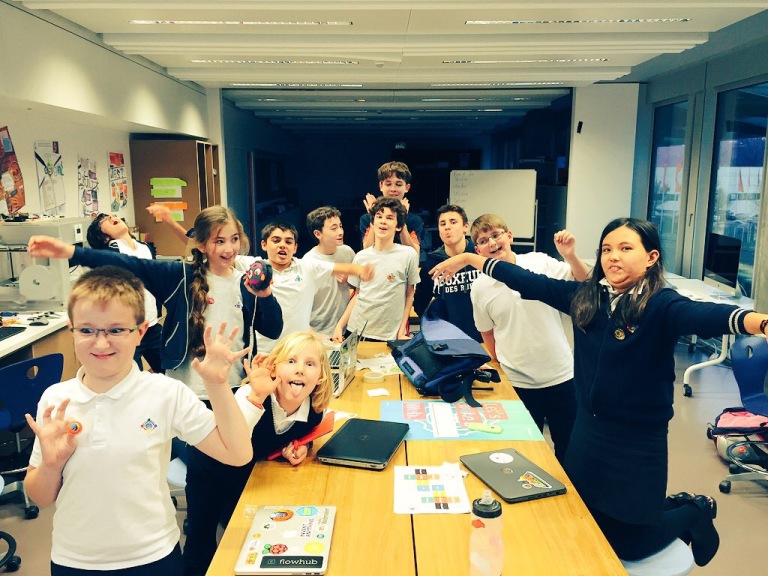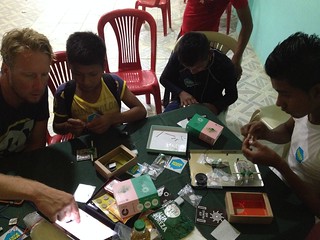Please join us in celebrating this month’s community spotlight, Mark Shillitoe, who is making an impact in his local community and beyond. Mark is currently leading digital learning innovations and creativity at a new international school in Switzerland. Outside of formal classrooms innovation, Mark has helped indigenous students in the Amazon with mobile storytelling and has extensive makerspace experience as he leads the very first Mozilla Club in Switzerland!
Mark Shillitoe
We asked Mark to tell us more about his exciting journey with the web. Here’s what he had to say:
What is your background with the web? With Mozilla?
I introduced students to blogging as a primary grade 4 teacher back in 2008 as a way to share learning stories to an authentic audience. From these early beginnings, we developed a more complete way of documenting and sharing these stories for specific units, or topics, of inquiry.
The blogging project with grade 4 was used for us all to document and share our learning journey. This particular unit was around inventions and it allowed us to become experts in our personal areas and hence learn lots more about inventions and the connections with the process. The blog enabled learning to continue way beyond the classroom and connect with the local community and families in more meaningful ways providing an authentic audience for the students. This example includes a rules, rights & responsibilities unit, in which students and families were particularly engaged.
I shared this experience, and a slightly remixed project, at Social Media week in Berlin, Germany: Exploring a learning journey of digital media in schools:sharing, connecting, reflecting, I ran a workshop where participants built clay characters and captured them in and around the event location, then posting their images to a social media space- EyeEm.
During this time, I connected with Stefania Druga of Hackidemia and Michelle Thorne of Mozilla Hive Berlin. With these two inspirations, I facilitated workshops to complement the technology integration programme I was leading as Curriculum coordinator in an International School: shillsipadproject and The iPad, The Witch, And the Wardrobe.

1st Mozilla Club participants in Switzerland. Photo courtesy of Mark Shillitoe.
I joined Mozfest online in 2012, 2013 and in London 2014, 2015, founding the first Mozilla Club in Switzerland this January. Our club, MakersJam, is jamming nicely as we mix up and remix some of the learning experiences provided within the Mozilla Learning space. The club has started to jam with Raspberry Pi, creating a web server with Coder where they are now applying their Webmaker skills to build web projects whilst exploring the mechanics of the web.

Thimble remix from Makersjam. Photo courtesy of Mark Shillitoe.
What is your most noteworthy #teachtheweb accomplishment?
Founding and leading the Mozilla Club at my school. I have integrated Mozilla tools including X-Ray Goggles and Thimble for the last two years into areas of our IB curriculum, specifically science and design. The club allows for greater freedom to explore and connect ideas further and opens further opportunities for hands-on making experiences in our MakerSpace, which I co-designed. I led Europe Code Week initiatives, the highlight being our Family MakerFaire.
Last summer I co-organised and led, Project Ceiba, a mobile learning initiative to empower local indigenous students in the Amazon Basin to tell their own story. We provided each community with mobile creation devices and a series of creative, hands on, experiential workshops. This initiative came at their own request and need to utilize their existing computers and develop digital literacy whilst embracing new mobile technologies.

Photo provided by Mark Shillitoe, left, with Project Ceiba participants.
Alongside mobile learning creation projects we held informal ‘MakerParties’ each afternoon with the goal of ‘Making Thinking Visible’. We utilised ‘Technology Will Save Us’ Kits to build with technology, creating synthesisers, a penalty shoot out football game, conductive dough earrings and much more.
How are you inspiring others to #teachtheweb/join in the Mozilla cause?
Besides the Project Ceiba campaign, next month I’ll be taking my ideas to Milan to Learning2, leading Precon workshop entitled, PopUp MakerSpaces. The idea is to stage accessible, remix-able engagements in visible, inviting places around the venue. I generally want participants to hack the conference and engage fellow participants by creating pop up learning experiences.

DIY Animation. Photo courtesy of Mark Shillitoe.
“A manifesto for making, a provocation to redesign classrooms, learning spaces, schools entrance lobbies to foster inquiry, curiosity and wonder. Be the Urban Exploring maker in your school, the Guerrilla technologist, the Graffiti Artist tinkerer. Be ready to provoke & inspire!” – Learning2, Mark Shillitoe
In summary, it is an exciting time, mostly inspired by experiences from Mozfest and the approach the festival takes. Bringing these ideas back into a school environment can be challenging as we continually push the boundaries of school structures, subjects and curriculum. Luckily, I have a supportive team mostly consisting or Arts and Design colleagues and incredibly creative students.
To learn more about Mark, follow him on Twitter and on his blog.
Do you know someone that has made tremendous strides towards spreading global web literacy or has made an impact through a Mozilla Club, classroom, or the #teachtheweb community at large? Share their story with us.











